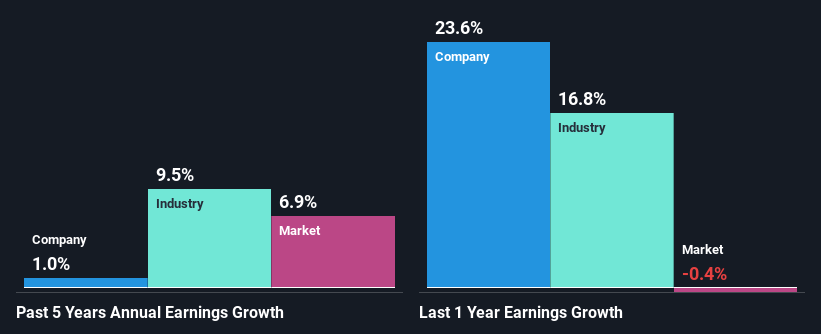Chongqing Gas Group Corporation Ltd. (SHSE:600917) Stock Is Going Strong But Fundamentals Look Uncertain: What Lies Ahead ?
Chongqing Gas Group's (SHSE:600917) stock is up by a considerable 12% over the past month. But the company's key financial indicators appear to be differing across the board and that makes us question whether or not the company's current share price momentum can be maintained. In this article, we decided to focus on Chongqing Gas Group's ROE.
ROE or return on equity is a useful tool to assess how effectively a company can generate returns on the investment it received from its shareholders. Put another way, it reveals the company's success at turning shareholder investments into profits.
View our latest analysis for Chongqing Gas Group
How Is ROE Calculated?
The formula for ROE is:
Return on Equity = Net Profit (from continuing operations) ÷ Shareholders' Equity
So, based on the above formula, the ROE for Chongqing Gas Group is:
7.5% = CN¥437m ÷ CN¥5.8b (Based on the trailing twelve months to June 2024).
The 'return' is the yearly profit. One way to conceptualize this is that for each CN¥1 of shareholders' capital it has, the company made CN¥0.08 in profit.
Why Is ROE Important For Earnings Growth?
We have already established that ROE serves as an efficient profit-generating gauge for a company's future earnings. Based on how much of its profits the company chooses to reinvest or "retain", we are then able to evaluate a company's future ability to generate profits. Generally speaking, other things being equal, firms with a high return on equity and profit retention, have a higher growth rate than firms that don’t share these attributes.
Chongqing Gas Group's Earnings Growth And 7.5% ROE
At first glance, Chongqing Gas Group's ROE doesn't look very promising. A quick further study shows that the company's ROE doesn't compare favorably to the industry average of 9.9% either. As a result, Chongqing Gas Group's flat net income growth over the past five years doesn't come as a surprise given its lower ROE.
Next, on comparing with the industry net income growth, we found that Chongqing Gas Group's reported growth was lower than the industry growth of 9.5% over the last few years, which is not something we like to see.

The basis for attaching value to a company is, to a great extent, tied to its earnings growth. It’s important for an investor to know whether the market has priced in the company's expected earnings growth (or decline). By doing so, they will have an idea if the stock is headed into clear blue waters or if swampy waters await. Is Chongqing Gas Group fairly valued compared to other companies? These 3 valuation measures might help you decide.
Is Chongqing Gas Group Efficiently Re-investing Its Profits?
Despite having a normal three-year median payout ratio of 49% (implying that the company keeps 51% of its income) over the last three years, Chongqing Gas Group has seen a negligible amount of growth in earnings as we saw above. So there could be some other explanation in that regard. For instance, the company's business may be deteriorating.
Additionally, Chongqing Gas Group has paid dividends over a period of nine years, which means that the company's management is determined to pay dividends even if it means little to no earnings growth.
Summary
Overall, we have mixed feelings about Chongqing Gas Group. While the company does have a high rate of profit retention, its low rate of return is probably hampering its earnings growth. Until now, we have only just grazed the surface of the company's past performance by looking at the company's fundamentals. You can do your own research on Chongqing Gas Group and see how it has performed in the past by looking at this FREE detailed graph of past earnings, revenue and cash flows.
Have feedback on this article? Concerned about the content? Get in touch with us directly. Alternatively, email editorial-team (at) simplywallst.com.
This article by Simply Wall St is general in nature. We provide commentary based on historical data and analyst forecasts only using an unbiased methodology and our articles are not intended to be financial advice. It does not constitute a recommendation to buy or sell any stock, and does not take account of your objectives, or your financial situation. We aim to bring you long-term focused analysis driven by fundamental data. Note that our analysis may not factor in the latest price-sensitive company announcements or qualitative material. Simply Wall St has no position in any stocks mentioned.
 Index Options
Index Options CME Group
CME Group Nasdaq
Nasdaq Cboe
Cboe TradingView
TradingView Wall Street Journal
Wall Street Journal